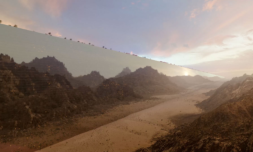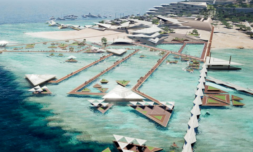Plans to build a £400 billion futuristic eco-metropolis promised an epicentre of sustainability, productivity, seamless living, and leisure for nine million people. But a whistle-blower testimony for the BBC has just uncovered the grim reality of the project, which involves human rights abuses and extrajudicial murder.
Remember The Line?
Part of the NEOM project, it takes a traditional city and structurally reimagines it to be more efficient, consolidating its overall footprint in order to protect its impact on nature (as we reported in 2022).
Running 170 kilometres from the ocean and further into the sand, plans revealed that it would be constructed of 500-metre-high mirrored walls built parallel to one another.
It also promised to diversify Saudi Arabia’s economy away from oil and run on 100% renewable energy, making it (by 2030) an epicentre of ‘sustainability, productivity, seamless living, and leisure for nine million people.’
‘No roads, cars, or emissions, people’s health and wellbeing will be prioritised over transportation and infrastructure, unlike traditional cities,’ continues the description on NEOM’s website.
A new video from #NEOM shows the progress of work on #TheLine
pic.twitter.com/8Dmma0e1Zh— Saudi Gazette (@Saudi_Gazette) May 5, 2024
‘The ideal climate all-year-round will ensure that residents can enjoy the surrounding nature. Residents will also have access to all daily essentials within a five-minute walk, in addition to high-speed rail – with an end-to-end transit of 20 minutes.’
When it was first announced, The Line attracted negative attention for its contribution to biodiversity loss and the choice of its location, as the desert-end of it is home to several local tribes who initially protested against making way for the futuristic eco-metropolis.
The criticism towards the latter was in response to Saudi King Mohammed bin Salman (MBS) calling the project ‘his pyramids,’ forcing the community to relocate and adding to Saudi Arabia’s longstanding reputation as a hot spot for human rights abuses.
So far, over 6,000 people have been displaced as a result of the early stages of construction, though human rights group ALQST estimates the numbers to be far worse. Today, the reality is even darker.




















